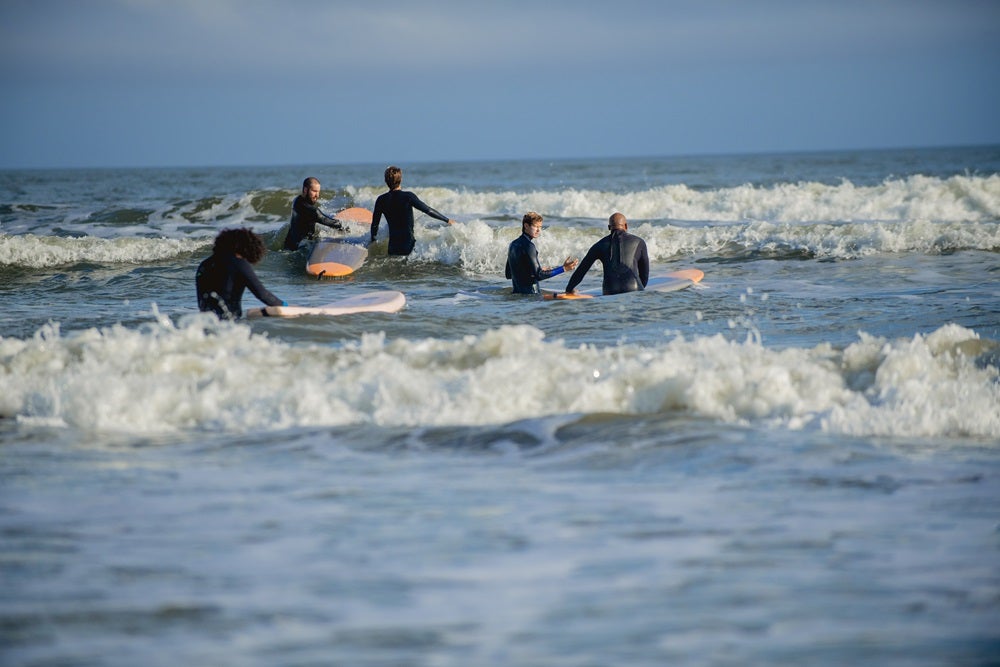News & Highlights
Topics: Clinical & Translational Research, CTSA Program, In the News
Out of the Impact Zone: Surf Therapy Helps Veterans Heal
Pilot project from MUSC's South Carolina Clinical & Translational Research Institute uses surf therapy to help veterans heal.

Twice a week, veterans and active-duty service members and their families gather at Folly Beach in Charleston. There, they learn the art of surfing with help from instructors and wellness coaches from the Warrior Surf Foundation.
But this surf instruction has a therapeutic twist. It not only enables veterans to gain surf skills but also uses surfing as a vehicle to teach techniques for coping with the psychological and physical scars of war.
Post-traumatic stress disorder, anxiety, depression, and substance use can affect veterans’ self-esteem, relationships with their families, and job performance. Traumatic brain injuries, amputations, and chronic pain all take their toll. Some veterans struggle with more than one of these issues.
The Warrior Surf Foundation was founded in 2015 by veteran Andrew Manzi. After two tours in Iraq, he struggled with a brain injury and PTSD that left him feeling not in control of his life. That began to change when he found surfing. It helped him focus on the present moment and not the past. It challenged him but also allowed him, in time, to gain a sense of mastery. It provided him an opportunity to interact with the sea and with nature – a healing experience.
Manzi began Warrior Surf so that he could help other veterans heal through surfing.
Good evidence-backed therapies exist for some of these problems, such as PTSD, but veterans can be hesitant to access them, fearing the stigma associated with mental health services. Traditional treatment venues, such as clinics and hospitals, can be stressful and off-putting and again drive home that the veteran is “sick.”
That’s why Warrior Surf offers veterans an opportunity for building positive experiences. It teaches coping techniques through surfing, enabling veterans and others to learn through experience and observation of role models. Visual learners can learn new concepts and ways of adapting to obstacles by drawing them out on the sand. Warrior Surf also offers a weekly surf instruction session, to build knowledge, competency, and self-esteem through surfing. Twice a month, a greater community of alumni and new participants join in a group surf session, where they can trade surf stories and life experiences within the safety of the Warrior Surf family.
Manzi and some of the other veterans who run Warrior Surf know surfing has worked for them. They also have seen positive changes in the lives of other veterans in Charleston who participate in the program.
Now they want to see if it can help veterans elsewhere.
To do this, they will need to standardize their therapy protocol, ensuring that everyone gets the same care, and base it on the best evidence. And they will need to collect credible data that the protocol works. That will help them get funding for extending their program beyond Charleston.
To help with that, Warrior Surf hired clinical psychologist Maia Gill, PhD, founder of Navi Institute, LLC, to develop and standardize the psychotherapy protocol that is offered to the veterans and begin to collect data on its usefulness.
Gill has developed an eight-module, 12-week therapy protocol through which veterans learn core adaptive skills and then participate in surf therapy. The protocol is based on evolutionary science research (ecology, biology, psychology, economics), which looks at how our experiences with nature can help us learn to adapt to hardships in our environment and enhance our satisfaction with daily living. For example, many hunter-gatherer societies had sharing rules ensuring that resources were distributed appropriately, strengthening bonds, and promoting collective survival. In one Warrior Surf module, veterans are taught to mimic sharing rules, rebuilding trust in relationships through “give-take” behaviors that foster friendships and instill a sense of belonging with others.
To evaluate the effectiveness of their therapeutic approach and determine which aspects are most beneficial, Warrior Surf and Gill turned to Alexandra Macdonald, PhD, and Genelle Sawyer, PhD, two clinical psychologists in the Department of Psychology at the Citadel, both of whom have extensive training and expertise in conducting trauma and PTSD research.
Together, they applied for a pilot project grant from the Community-Engaged Scholars Program (CES-P) at Medical University of South Carolina (MUSC) Clinical & Translational Research Institute. CES-P funds teams of academic and community partners in their preliminary efforts to develop and conduct pilot programs using community-based participatory research.
With these funds, the Warrior Surf-Citadel team is currently testing the 12-week standardized protocol in several groups of veterans involved with Warrior Surf. Veterans are assessed using a number of wellness and psychological scales before beginning treatment and again at the completion of treatment and one-month follow-up. Once all data has been collected, Macdonald and Sawyer will be able to provide metrics to Warrior Surf on how well the program works and which aspects work best.
With that information, Warrior Surf hopes to strengthen its program and begin to share it with veterans in other geographic areas so that surfing can help more veterans heal.
Originally published in MUSC Catalyst News.

